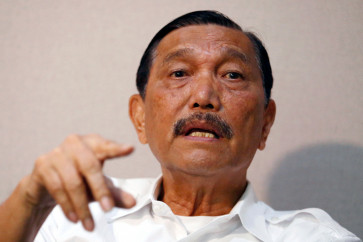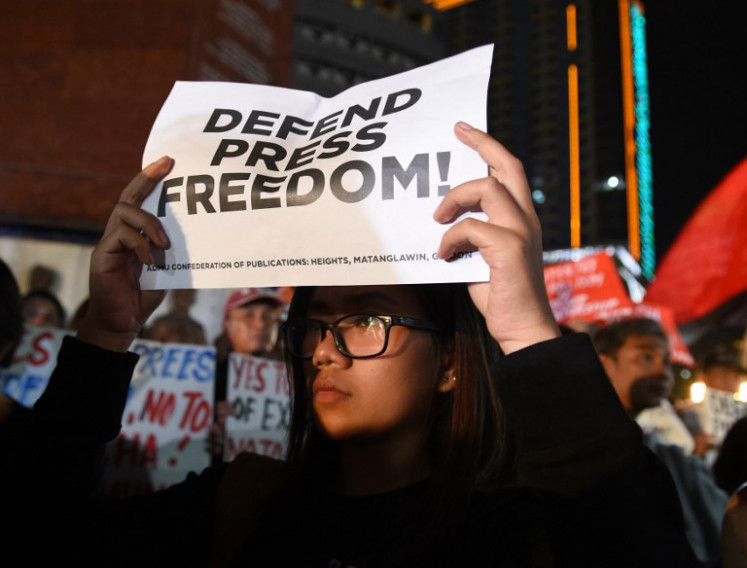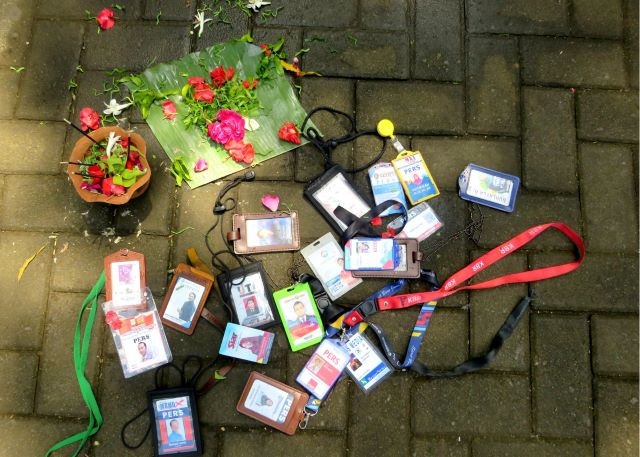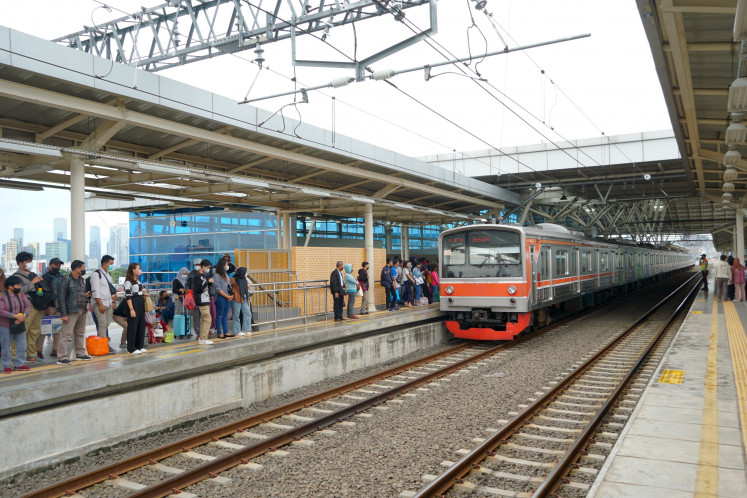APEC vows to avoid mishaps
Au revoir, not goodbye: APEC leaders pose for a photo before starting the summitâs final day of meetings at the Sofitel Hotel in Nusa Dua, Bali, on Tuesday
Change Size
 Au revoir, not goodbye: APEC leaders pose for a photo before starting the summitâs final day of meetings at the Sofitel Hotel in Nusa Dua, Bali, on Tuesday. China will be hosting next yearâs summit in Beijing. (JP/Jerry Adiguna) (JP/Jerry Adiguna)
Au revoir, not goodbye: APEC leaders pose for a photo before starting the summitâs final day of meetings at the Sofitel Hotel in Nusa Dua, Bali, on Tuesday. China will be hosting next yearâs summit in Beijing. (JP/Jerry Adiguna) (JP/Jerry Adiguna)
A
span class="inline inline-none">Au revoir, not goodbye: APEC leaders pose for a photo before starting the summit's final day of meetings at the Sofitel Hotel in Nusa Dua, Bali, on Tuesday. China will be hosting next year's summit in Beijing. (JP/Jerry Adiguna)
Amid a backdrop of weakening global trade and slower growth in the region, the leaders of 21 Pacific-rim economies pledged to implement prudent policies to maintain stability at the APEC Summit in Nusa Dua, Bali, on Tuesday.
As the leaders wrapped up the summit, they declared the need to strengthen macroeconomic policies and work together to promote sustainable and inclusive growth in the region.
'We will implement prudent and responsible macroeconomic policies to ensure mutually reinforceable growth, to maintain economic and financial stability in the region and prevent a negative spillover effect,' said the leaders' joint declaration.
The need for a sound policy was recognized amid fresh concerns over the state of the US economy, following a budget impasse that disabled some government functions in the world's largest economy.
Unsound budget policies have caused a global spillover effect as growth in the US economy is predicted to contract.
US President Barack Obama's absence at the summit, due to the impasse, to some extent affected the progress of the Trans-Pacific Partnership (TPP) negotiations, all the members of which are APEC countries.
His absence also paved the way for China, Russia and Japan to assert their influence in the region.
Aside from concerns over policy mishaps, the leaders also agreed to guard against pressure to raise new trade and investment barriers.
'To that end, we extended our standstill commitment until the end of 2016 and reaffirmed our pledge to roll back protectionist and trade-distorting measures.'
As the host of the summit, Indonesia's attempt to push its interests gained some support.
While failing to have palm oil and rubber included on the list of environmentally friendly goods subject to liberalization in 2015, Indonesia's proposal to include the commodities for tariff cuts or exemptions under a new category was accepted.
APEC members agreed to explore the trade in products that contributed to sustainable and inclusive growth through rural development and poverty alleviation. This will provide leeway for palm oil and rubber to be treated as such products, and subject to tariff reductions or exemptions.
Indonesia also convinced APEC members to renew support to help break the deadlock in the upcoming World Trade Organization (WTO) negotiations in Bali in December.
The leaders issued a separate statement supporting the multilateral trading system.
Support from APEC is crucial as the grouping accounts for 54 percent of global gross domestic product (GDP) and 44 percent of global trade.
The APEC Summit is a forum in which the region's leaders have the chance to talk through global issues in an informal and non-binding setting.
However, the 24-year-old forum has been the subject of criticism for its lack of focus, as it tends to work simultaneously on so many issues and tries to resolve virtually all development problems.
Questions have also been raised about its impact on businesses and the public in general.
Trade Minister Gita Wirjawan dismissed the concerns, saying that the forum had helped Indonesia gain wider access to trade and financing.
'It has undoubtedly helped to boost our international trade as barriers are lifted,' Gita said.
Center for Strategic and International Studies (CSIS) senior economist Titik Anas agreed with Gita, saying that APEC's commitment to inclusive growth would provide assistance and better access for small and medium enterprises (SMEs) in the grouping's huge market.
'At the same time, it exposes Indonesia's SMEs to more competition. Indonesia's government should maintain the reform momentum to prepare its business sector to benefit from the market.'
Indonesia was also praised for its success in maintaining security and order during the summit.
The Indonesian People's Alliance (IPA) and the Alliance of Students against APEC canceled their plans to hold a demonstration on Tuesday.
Dewa Gede Wiryangga, a representative of the Alliance of Students against APEC, hinted at his disappointment over the cancellation and cited there was 'unfinished consolidation' among activist groups and 'a lack of coordination' over the permit.
Indonesia has handed over its rotating chairmanship to China, where next year's summit will be held.
Selected leaders' declaration
'¢ Will advance implementation of our commitment to reduce tariffs on the APEC List of Environmental Goods (EGs) to 5 percent or less by the end of 2015.
'¢ Established the APEC Public-Private Partnership on Environmental Goods and Services (PPEGS) to enhance our work to address trade and investment issues relevant to this sector. Will explore trade in products that contribute to sustainable and inclusive growth through rural development and poverty alleviation.
'¢ Acknowledged the work this year on local content requirements and welcomed the APEC Best Practices to Create Jobs and Increase Competitiveness.
'¢ Will continue to implement the APEC Investment Facilitation Action Plan, including by advancing Public Private Dialogue on Investment and encourage officials to work with the private sector to build and improve upon Corporate Social Responsibility practices and sustainable investment.
'¢ Will advance actions to address the next generation trade and investment issues as agreed in 2011 and 2012, including by finalizing the APEC Innovation and Trade Implementation Practices, as soon as possible.
'¢ Under Physical Connectivity, we commit to cooperate in developing, maintaining and renewing our physical infrastructure through a Multi-year Plan on Infrastructure Development and Investment.
'¢ Endorse the target of 1 million intra-APEC university-level students per year by 2020, as well as support further work that will enhance the mobility of students, researchers, and education providers, and the network of existing bilateral agreements.
'¢ Progress work on the Travel Facilitation Initiative as a way to promote tourism and facilitate business, by making travel more accessible, convenient and more efficient while also safe and secure.









